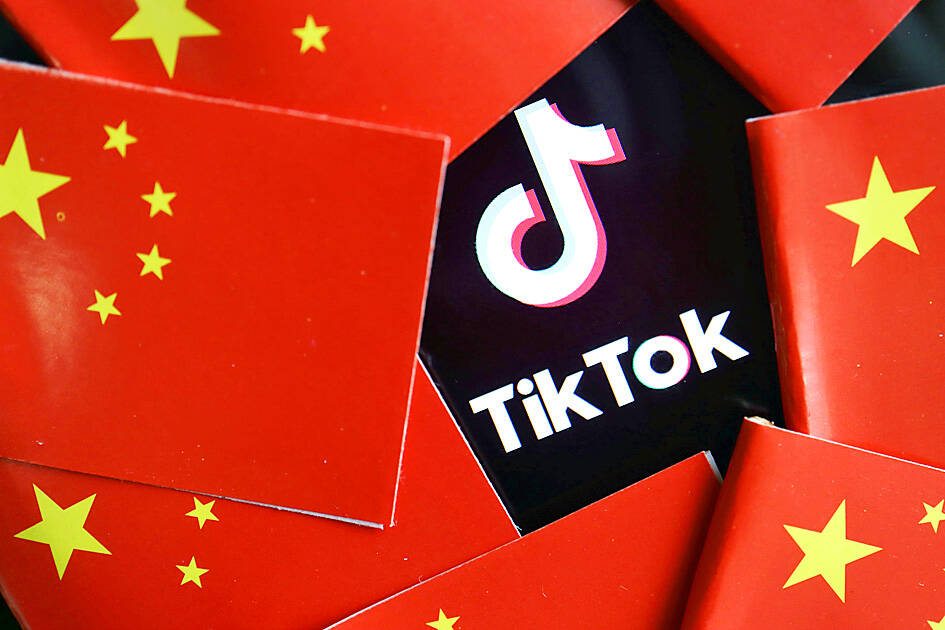Young Taiwanese are increasingly consuming Chinese content on TikTok, which is changing their views on identity and making them less resistant toward China, researchers and politicians were cited as saying by foreign media.
Asked to suggest the best survival strategy for a small country facing a powerful neighbor, students at National Chia-Yi Girls’ Senior High School said “Taiwan must do everything to avoid provoking China into attacking it,” the Financial Times wrote on Friday.
Young Taiwanese between the ages of 20 and 24 in the past were the group who most strongly espoused a Taiwanese identity, but that is no longer the case, it wrote, adding that this age group had also begun using colloquial terms previously only used in China.

Photo: REUTERS
Citing last year’s “Taiwan Internet Report,” an annual independent survey, the newspaper wrote that while only about 22 percent of Taiwanese are TikTok users, as many as 44 percent of elementary-school students and 60 percent of junior-high school students use the app. The majority of those young users are girls, it added.
Also, while the number of users in Taiwan remains lower than in the US or some European countries, concerns about the app’s influence on young people are especially pronounced in Taiwan, given the country’s relationship with China.
While most of the users are interested in dance or entertainment-related content, TikTok’s algorithm pushes “soft” political content to all users, it said, adding that researchers who created an account masquerading as a young female user were shown propaganda portraying Chinese “democracy” favorably in comparison to Taiwan’s political system.
The Financial Times wrote that studies last year by Rutgers University researcher Lee Jussim found that TikTok’s algorithm suggested a “disproportionately high ratio” of content favorable to the Chinese Communist Party compared with other apps such as Instagram or YouYube, and that users of the platform tended to hold a significantly more favorable view of China’s human rights record. Users of the platform “increasingly inhabit echo chambers,” it said.
Taiwanese think tank Doublethink Lab researcher Eric Hsu said that even if TikTok does not change attitudes toward China among young Taiwanese, it would weaken their vigilance and willingness to resist.
He believes that this subtle influence is more worrying because it might unconsciously change the values and political attitudes of Taiwanese in general.
Taiwanese young people are frustrated with local economic and social issues, such as stagnant wages and high housing prices, and TikTok would play to these sentiments, further exacerbating the situation, he said.
The Financial Times cited Democratic Progressive Party (DPP) member Enoch Wu (吳怡農) as suggesting Taiwan follow the US’ lead in banning TikTok, while DPP Legislator Puma Shen (沈伯洋) said that doing so would be difficult.
If the ruling DPP tried to ban TikTok, it would be attacked for limiting free speech, Shen said.
“We need to find an effective way of communicating with our young people” to avoid shattering “their trust in our democracy,” Hsu said.
“Once our society is divided and our democratic system is no longer trusted, Taiwan will lose its ability to resist China,” he added.

The combined effect of the monsoon, the outer rim of Typhoon Fengshen and a low-pressure system is expected to bring significant rainfall this week to various parts of the nation, the Central Weather Administration (CWA) said. The heaviest rain is expected to occur today and tomorrow, with torrential rain expected in Keelung’s north coast, Yilan and the mountainous regions of Taipei and New Taipei City, the CWA said. Rivers could rise rapidly, and residents should stay away from riverbanks and avoid going to the mountains or engaging in water activities, it said. Scattered showers are expected today in central and

People can preregister to receive their NT$10,000 (US$325) cash distributed from the central government on Nov. 5 after President William Lai (賴清德) yesterday signed the Special Budget for Strengthening Economic, Social and National Security Resilience, the Executive Yuan told a news conference last night. The special budget, passed by the Legislative Yuan on Friday last week with a cash handout budget of NT$236 billion, was officially submitted to the Executive Yuan and the Presidential Office yesterday afternoon. People can register through the official Web site at https://10000.gov.tw to have the funds deposited into their bank accounts, withdraw the funds at automated teller

COOPERATION: Taiwan is aligning closely with US strategic objectives on various matters, including China’s rare earths restrictions, the Ministry of Foreign Affairs said Taiwan could deal with China’s tightened export controls on rare earth metals by turning to “urban mining,” a researcher said yesterday. Rare earth metals, which are used in semiconductors and other electronic components, could be recovered from industrial or electronic waste to reduce reliance on imports, National Cheng Kung University Department of Resources Engineering professor Lee Cheng-han (李政翰) said. Despite their name, rare earth elements are not actually rare — their abundance in the Earth’s crust is relatively high, but they are dispersed, making extraction and refining energy-intensive and environmentally damaging, he said, adding that many countries have opted to

PEACE AND STABILITY: Maintaining the cross-strait ‘status quo’ has long been the government’s position, the Ministry of Foreign Affairs said Taiwan is committed to maintaining the cross-strait “status quo” and seeks no escalation of tensions, the Ministry of Foreign Affairs (MOFA) said yesterday, rebutting a Time magazine opinion piece that described President William Lai (賴清德) as a “reckless leader.” The article, titled “The US Must Beware of Taiwan’s Reckless Leader,” was written by Lyle Goldstein, director of the Asia Program at the Washington-based Defense Priorities think tank. Goldstein wrote that Taiwan is “the world’s most dangerous flashpoint” amid ongoing conflicts in the Middle East and Russia’s invasion of Ukraine. He said that the situation in the Taiwan Strait has become less stable